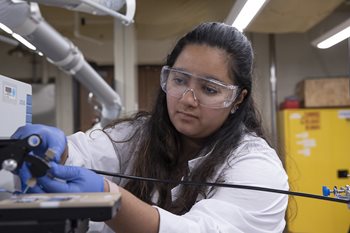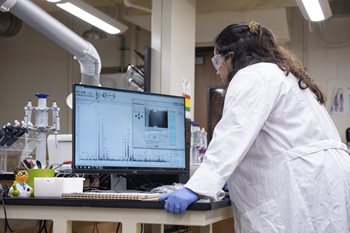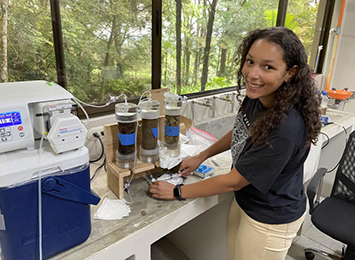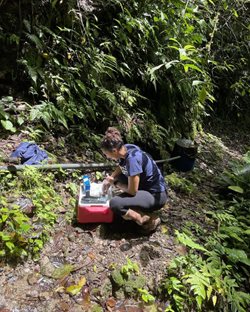By Sydnie Harrell, Office of Undergraduate Studies at Texas A&M University
LAUNCH: Undergraduate Research has opted for a completely virtual format for this year’s Summer Undergraduate Research Poster Session after canceling the event in 2020 due to Covid-19. The poster session will be available online all week, Aug. 6-Aug. 13, and is free to access.
“With all of the uncertainties this spring and summer about in-person events, we made the decision early to go virtual,” LAUNCH: Undergraduate Research Associate Director Dr. Sarah Misemer said. “The virtual poster session will allow all students to participate regardless of their location and/or health concerns.”
When the session was in person, it was held in the atrium of the Interdisciplinary Life Sciences Building, and students displayed their posters and abstracts. This year, research will be showcased using the ForagerOne-Symposium platform, the same platform used for the LAUNCH: Undergraduate Research Scholars Symposium in February. Presenters are required to submit an abstract and a pre-recorded research presentation for the session.
“Students may elect to also include a digital poster, slide deck, or videos of their research projects,” Misemer said. “Our hope is that students will acquire new skills as they present their research in a virtual setting, and we have encouraged students to consult our resources on how to include best practices in accessibility so that their research will be inclusive and available to the broadest audience possible.”
Bianca Aridjis-Olivos – University of Dallas

University of Dallas junior Bianca Aridjis-Olivos is participating in the LAUNCH Poster Session as a culmination of the Chemistry Research Experiences for Undergraduates (REU) funded by the National Science Foundation (NSF). She is showcasing her group’s research and work with mass spectrometry imaging related to early-onset Alzheimer’s; the group consists of students Shuli Tang, Tingyuan Yang, Xi Chen, Madison Edwards, and Syuan-Ting Guo.
“I was interested in working with [Dr. Xin Yan’s group for the Chemistry REU] because I have always been fascinated with analytical chemistry, specifically with the applications of mass spectrometry,” Aridjis-Olivos said. “When I found that our project would involve studying such an important disease such as Alzheimer’s, which affects so many people, I was excited to learn all I can and to contribute to research with an ultimate goal of understanding the disease for early diagnosis.”

Aridjis-Olivos is double majoring in Chemistry and Spanish and hopes to pursue a career in the forensic field. Mass spectrometry, one of the focuses of the research, has a wide field of applications, including forensics, making the research project beneficial to her career goals.
“The research I am showcasing in the poster session is our work with mass spectrometry imaging using desorption electrospray ionization to shed light on the molecular pathology of [early-onset] Alzheimer’s disease in relation to the formation of the abnormal formation of [amyloid-beta] (Aβ) plaque deposits,” Aridjis-Olivos said. “Gaining the experience of analyzing data and operating instruments such as the mass spectrometer, fluorescent microscopes, and cryostat has just been such a wonderful opportunity.”
In preparation for the poster session, Aridjis-Olivos practiced showcasing the poster in person before recording her presentation and sharing her poster with her research group. She has not presented in a poster session before and finds that the virtual format has made participating more accessible.
“I definitely think that was one of the silver linings of something as devastating as the pandemic; it forced us to think of creative and innovative ways to incorporate technology to communicate from our quarantine bubbles,” Aridjis-Olivos said. “I think it is amazing how during a time that was so isolating, technology has allowed us to connect from further distances that may not have been possible or even considered before.”
Shayla Husted – Marquette University


Marquette University senior Shayla Husted collecting water samples for analysis.
Marquette University senior Shayla Husted is showcasing research she conducted this summer to advance her presentation skills and network in hopes of finding graduate programs to apply to this fall. She is participating in NSF’s Costa Rica REU at Texas A&M University and has been assisted by her mentor, Hydrogeology Associate Professor Dr. Peter S. Knappett, as well as other professors and students from Texas A&M, the University of Texas (UT), and The University of Texas at San Antonio (UTSA).
“As someone who is planning to apply for graduate programs this fall, I believe it is highly important to participate and present at research poster sessions,” Husted said. “My mentor is Dr. Peter S. Knappett, who has assisted with my research project with the additional help from Reid Buskirk (A&M), William Nguyen (UT), Dr. Peyton Smith (A&M), Dr. Salvatore Calabrese (A&M), Dr. Harshad Vijay Kulkarmi (UTSA), Dr. Kelly Brumbelow (A&M), and Dr. Georgianne Moore (A&M).
Husted applied to the Costa Rica REU because of its heavy focus on eco-hydrology; she plans on continuing her education in a Ph.D. program in environmental science. The research she is presenting involved studying sources and variability of carbon through the layers of the rainforest floor. She tested her hypothesis in Costa Rica through a sequential column experiment, an experiment where a controlled solution flows through a column with a medium.

“We hypothesized the mixing between the layers of leaf litter, mineral soil, and saprolite will produce different carbon end members,” Husted said. “This hypothesis was examined by constructing a sequential flow column experiment where the rainforest floor material from the Howler Monkey Watershed was packed into three individual columns, and samples of water were collected after passing through each individual column to examine alkalinity, specific conductance, and ammonia outputs.”
Husted has participated in two poster sessions prior to this one. The first was in October 2019 at Florida International University at the Ronald McNair Scholars Conference. In April, she presented two posters at Marquette University's Biological Science Poster Session for Undergraduate Research: one on drought traits and one on algae and wastewater.
“I feel indifferent about the session being online,” Husted said. “The session I participated in [in] April was virtual as well, which had its pros and cons, but I believe presenting in front of a live audience provides students with a better experience to interact with [their] audience. On the flip side, I was able to have family members who live in different states attend my session and support my research which most likely would have not happened if the session was in-person.”
Presentations will be available to view publicly August 6-13, 2021. Read details on how to access the sessions.
###
Media Contact: Anna Transue, transuea@tamu.edu